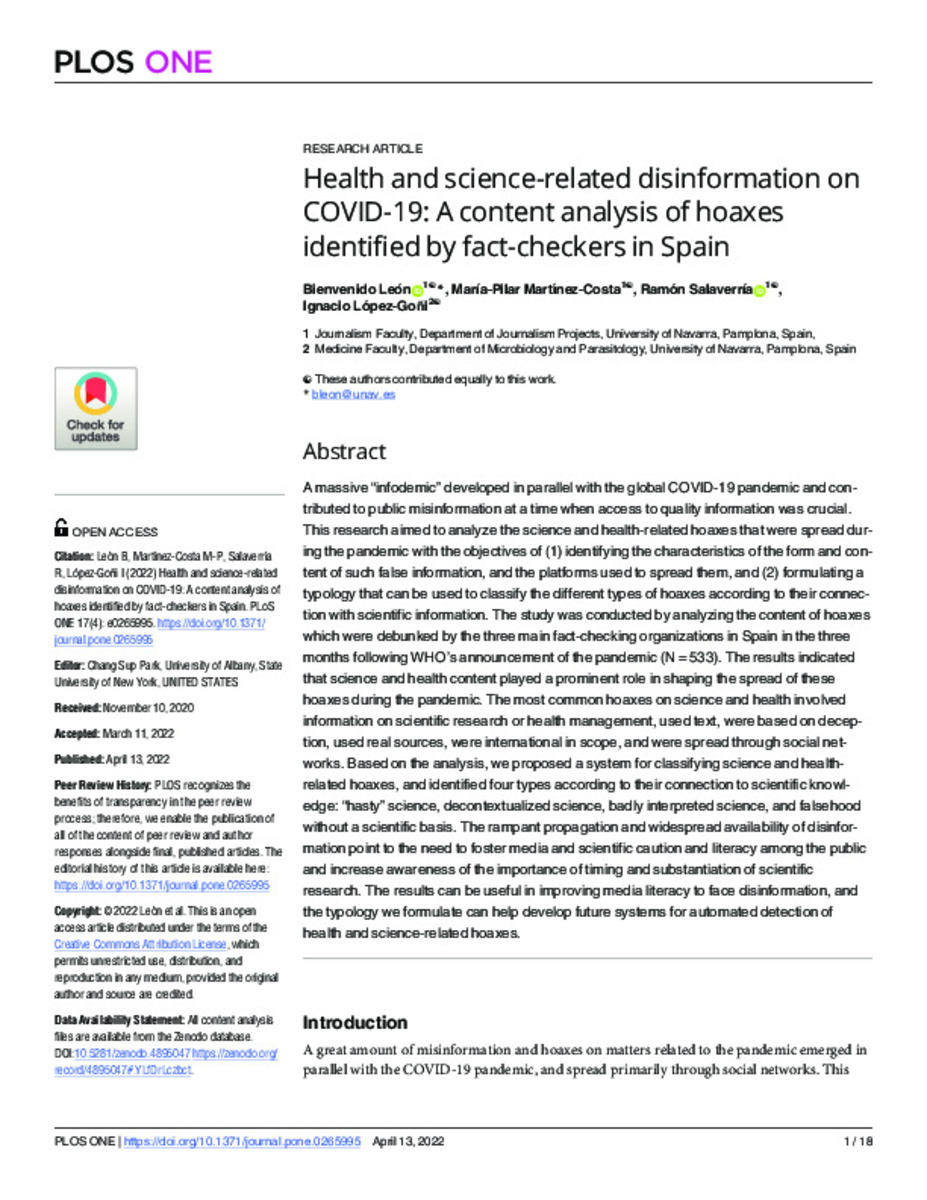Full metadata record
| DC Field | Value | Language |
|---|---|---|
| dc.creator | León-Anguiano, B. (Bienvenido) | - |
| dc.creator | Martínez-Costa-Pérez, M.P. (María del Pilar) | - |
| dc.creator | Salaverría-Aliaga, R. (Ramón) | - |
| dc.creator | Lopez-Goñi, I. (Ignacio) | - |
| dc.date.accessioned | 2022-05-03T12:42:28Z | - |
| dc.date.available | 2022-05-03T12:42:28Z | - |
| dc.date.issued | 2022 | - |
| dc.identifier.citation | León-Anguiano, B. (Bienvenido); Martínez Costa-Pérez, M. (María del Pilar); Salaverría-Aliaga, R. (Ramón); et al. "Health and science-related disinformation on COVID-19: A content analysis of hoaxes identified by fact-checkers in Spain". Plos One. 17 (4), 2022, e0265995 | es |
| dc.identifier.issn | 1932-6203 | - |
| dc.identifier.uri | https://hdl.handle.net/10171/63433 | - |
| dc.description.abstract | A massive "infodemic" developed in parallel with the global COVID-19 pandemic and contributed to public misinformation at a time when access to quality information was crucial. This research aimed to analyze the science and health-related hoaxes that were spread during the pandemic with the objectives of (1) identifying the characteristics of the form and content of such false information, and the platforms used to spread them, and (2) formulating a typology that can be used to classify the different types of hoaxes according to their connection with scientific information. The study was conducted by analyzing the content of hoaxes which were debunked by the three main fact-checking organizations in Spain in the three months following WHO¿s announcement of the pandemic (N = 533). The results indicated that science and health content played a prominent role in shaping the spread of these hoaxes during the pandemic. The most common hoaxes on science and health involved information on scientific research or health management, used text, were based on deception, used real sources, were international in scope, and were spread through social networks. Based on the analysis, we proposed a system for classifying science and health-related hoaxes, and identified four types according to their connection to scientific knowledge: ¿hasty¿ science, decontextualized science, badly interpreted science, and falsehood without a scientific basis. | - |
| dc.description.sponsorship | This study was funded by RRSSalud, via the BBVA Foundation, within the Grants for Scientific Research Teams—Economy and Digital Society, 2019. This study was also funded by IBERIFIER—Iberian Digital Media Research and Fact-Checking Hub, via the European Commission under the call CEF-TC-2020–2 (European Digital Media Observatory), grant number 2020-EU-IA- 0252. The grants were not specifically assigned to any author but to the whole project. | - |
| dc.language.iso | en | - |
| dc.rights | info:eu-repo/semantics/openAccess | - |
| dc.subject | COVID-19 | - |
| dc.subject | Disinformation | - |
| dc.title | Health and science-related disinformation on COVID-19: A content analysis of hoaxes identified by fact-checkers in Spain | - |
| dc.type | info:eu-repo/semantics/article | - |
| articulos.autor.creador | Spain | - |
| dc.relation.publisherversion | https://journals.plos.org/plosone/article?id=10.1371/journal.pone.0265995 | - |
| dc.description.note | This is an open access article distributed under the terms of the Creative Commons Attribution License | - |
| dc.identifier.doi | 10.1371/journal.pone.0265995 | - |
| dadun.citation.number | 4 | - |
| dadun.citation.publicationName | Plos One | - |
| dadun.citation.startingPage | e0265995 | - |
| dadun.citation.volume | 17 | - |
Files in This Item:
Statistics and impact
Items in Dadun are protected by copyright, with all rights reserved, unless otherwise indicated.






